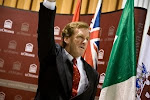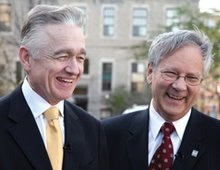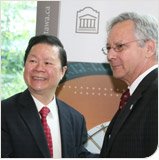 |
| Charles Hackland |
[CORRECTION made on June 7, 2014::: In court, on June 6, 2014, Justice Michel Charbonneau stated on the record, in his decision to order a permanent injunction against the defendant in the St. Lewis v. Rancourt lawsuit, that Justice Hackland had sated to those in his entourage in May 2013 that he would be resigning in May 2014. Therefore, it was known by other judges since May 2013 that Justice Hackland would be resigning his position and returning to the bench in May 2014. Consequently, the chronology of events described below cannot be taken as evidence supporting a link between Rancourt's request that Justice Charbonneau recuse himself, and Justice Hackland's resignation.]
By Denis G. Rancourt
How often does a Regional Senior Judge resign, without any explanation?
The media did not report this unusual event. A Department of Justice memo has the terse statement "He resigned from that position effective May 8, 2014."
This is the man who handled some of the most high-profile cases of the last several years. Gone.
He was replaced by Justice James E. McNamara on May 12, 2014, as per the same memo.
I'm going to boldly propose that this resignation-and-replacement was not a mere random event, and that it is related to the on-going defamation case St. Lewis v. Rancourt; that the thematic and chronological relations are not simply coincidences.
On May 6, 2014, I brought a Recusal Motion that was heard and decided by Justice Michel Z. Charbonneau on May 7, 2014. HERE are all the court-filed documents for that motion.
The motion asked Justice Charbonneau to recuse himself from the trial of the St. Lewis v. Rancourt case because the case is all about the University of Ottawa, because the plaintiff's legal fees are paid by the University of Ottawa, because all of Justice Charbonneau's university degrees are from the University of Ottawa, because Justice Charbonneau is a regular and annual donor to the university, because Justice Charbonneau was a law firm partner with the case management judge in the case (Justice Robert Smith, who is barred from being the trial judge), and because there is thus a mutual financial interest between the university and the trial judge (which I explicitly argued orally).
I also argued in my motion that Justice McNamara had set a precedent by recusing himself in a litigation in which the University of Ottawa was a party, because he has a degree from the university (see Justice McNamara's endorsement decision here), and that Justice McNamara had asked Justice Hackland to assign a judge that had no ties to the University of Ottawa in that case. The latter was doubly specified via a separate endorsement signed by Master Calum MacLeod (see here).
And, I showed that I had asked Justice Hackland, back in 2012, to assign a case judge that has no ties to the University of Ottawa, that he answered he would not and that if I had "legitimate" bias concerns to bring them in a motion (see Hackland letters here).
Justice Charbonneau decided the recusal motion the same day that it was heard. He decided to not recuse himself, he was silent on my shared-interests argument, and he stated that if a judge were to recuse himself for the mere reason that he had a degree from the University of Ottawa, that the said judge would be avoiding his duties.
The next day, May 8, Justice Hackland resigned, and on May 12, 2014, he was replaced by Justice McNamara (Justice Department memo).
And, it turns out from the memo, that Justice Hackland practiced with the Gowlings law firm prior to his appointment to the bench in 2003. The law firm representing the plaintiff in St. Lewis v. Rancourt is the Gowlings firm.
Would it not have been simple for Justice Hackland to assign a trial judge that has no ties to the University of Ottawa?
Is it reasonable for me to have a "reasonable apprehension of bias" (legal term meaning a good reason to seek a judge's recusal)?
Cynthia McKinney thinks so: LINK.




No comments:
Post a Comment